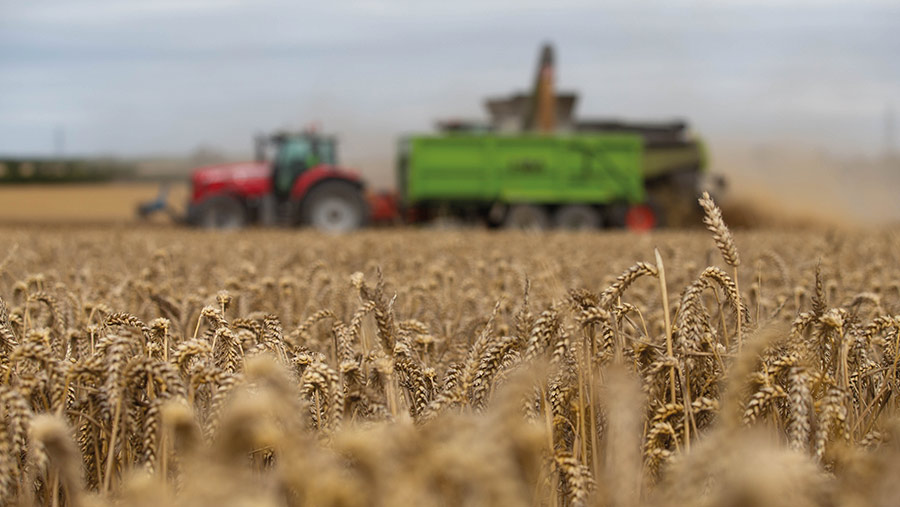Food security debate: Balancing imports v self-sufficiency
 © Tim Scrivener
© Tim Scrivener The question of where our food comes from has seldom been more important but is food security and food self-sufficiency the same thing? Chief reporter Johann Tasker examines the current debate.
Farm leaders argue that a robust supply chain requires high levels of domestic production but others believe that an over-reliance on domestically-produced food could leave the country vulnerable.
The NFU’s view
“For an island nation, being able to feed our population is absolutely critical,” said NFU president Minette Batters. “Even as a global trading nation, shocks can expose fragilities in any reliance on imports.”
See also: ‘Horticulture revolution’ needed for food self sufficiency
Mrs Batters made the comments earlier this month on what the NFU calls National Self-Sufficiency Day. The UK would run out of food on 21 August if it had to rely entirely on domestic supplies for a whole year, according to the union.
“Imports will always play a crucial role in our food system, but our own self-sufficiency must be paid more attention by government,” said Mrs Batters. “It is stagnating. We sit now at only 64% self-sufficiency, having fallen from over 75% in the mid-1980s.
“We cannot let our self-sufficiency slip further. The government has a crucial role to play in this. Food security should be placed at the heart of wider government policies and there needs to be an annual reporting system to ensure we do not allow our domestic food production to diminish.”
Food security v self-sufficiency
Many commentators and agricultural economists take a different view. Agribusiness consultant Carl Atkin notes food security and self-sufficiency are very separate things – and the two should not be confused.
“Food security is the state of having reliable access to a sufficient quantity of affordable and nutritious food,” he said. “Domestic indigenous production plays a part in that, for sure. No-one is saying it doesn’t. But the two are not the same thing.”
It could be argued that too much self-sufficiency actually reduces food security, Mr Atkin said. That’s because being 100% self-sufficient in a particular foodstuff would be – almost literally – like putting all your eggs in a single basket.
In such a scenario, over-reliance on domestic production would put the food supply chain at risk if there was a problem in a particular crop or livestock sector. “It is very important that we separate the two terms,” said Mr Atkin.
Balancing act
Similarly, too much reliance on food imports can also be risky, according to Jonathan Finlay, a House of Commons library researcher specialising in agriculture and food, who has been examining food security and how it is measured. (See Food security: What is it and how is it measured?)
“It is a balancing act,” said Mr Finlay. “A completely self-sufficient country would be vulnerable to events at home like adverse weather. Equally, too much reliance on a few specific imports can leave a country exposed to international disruption.”
Historically, the UK’s self-sufficiency in food has varied. Over the past 40 years, it has been as high as 78% in 1984, but as low as 60% in 2005. Today, government figures published annually by Defra suggest it stands at about 64%.
Some foods have to be imported, of course. Delving deeper, the same figures show that the UK is 77% self-sufficient in “indigenous” food types – measuring only the food we can produce in the UK and excluding items we cannot, such as bananas and coffee.
National Food Strategy
The issue of self-sufficiency and food security is being examined in detail by Henry Dimbleby, who is overseeing the government’s National Food Strategy. The coronavirus pandemic has served as a reminder of their importance, he has warned.
“Some commentators were quick to argue that the UK must start growing more of its own food to protect us from the vagaries of our long global supply chains,” Mr Dimbleby has said.
“Four months later, it is striking to see how quickly the system has righted itself.”
Published this summer, Part One of his strategy points out that the UK has been a net importer of food since the 1830s. Some established import routes for food remain desirable and absolute autarky – or self-sufficiency – is not, it warns.
That doesn’t mean there is room for complacency, said Mr Dimbleby.
Due to be published in 2021, Part Two of the strategy will examine whether there is an optimal level of self-sufficiency we should target – whether in aggregate or varying across the seasons and foodstuffs.
It will also ask whether food security should be quantified using different measures altogether.
